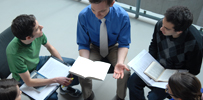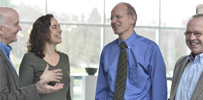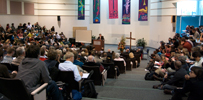Introduction to the Series
Despite all of the positive contributions science makes to life, for many people it is at odds with Christian faith, as the findings of science seem to conflict with the story of the Bible. This series of lectures seeks to address this misconception, showing how the Christian story gives context and meaning to the work of science. In turn, it shows how the discipline of science enables us to better know God through his created world and informs us of how best to fulfill our human calling to govern and care for the world.
The series comprises six lectures:
- The Co-inherence of Science and Faith: Matter that Matters
- How are Science and Faith 'First Cousins'?
- Why God Won't Go Away
- Creation or Evolution: Do We Have to Choose?
- Reading Genesis 1 and 2
- Critical Issues in Bioethics
The series opens by addressing why it is important that we reconcile faith and science, through a lecture that offers seven reasons for a positive relationship between science and theology. In order to see how we have come to a place of division between the two spheres, the second lecture gives a brief history of the conversation between science and Christianity, revealing that conflict has not always been the norm.
So that we can repair the broken relationship between faith and science, the next three lectures address the primary challenges faced by those seeking to bring the two areas together. The tough questions these lectures address include: 1) How to respond to the “New Atheism” (as represented by public intellectuals like Richard Dawkins and Christopher Hitchens); 2) How to reconcile a creational worldview with an evolutionary worldview; and 3) How to read the Bible faithfully in light of the perceived incongruence between scientific theories and historical interpretations of Scripture.
The final lecture in the series demonstrates why bringing science and faith together is of critical importance to Christian mission in the 21st century. The lecture offers insights from a medical practitioner on how faith necessarily informs bioethics. In doing so, it helps us as we navigate ethical challenges and seek to engage with science in the pursuit of the created world’s flourishing.
Whether you are a student, teacher, scientist, practitioner, or merely curious, this series of lectures given by practitioners and academics who hold both science and faith in highest regard will enable you to begin to see how faith and science co-inhere. It is our hope that these lectures address questions you have held about the compatibility of faith and science, encouraging and equipping you in your work and further exploration of these issues.
Additional Resources
General:
- McGrath, Alister. Science and Religion: A New Introduction. West Sussex, UK: Wiley-Blackwell, 2010.
- Polkinghorne, John and Nicholas Beale. Questions of Truth: Fifty-one Responses to Questions about God, Science, and Belief. Louisville: Westminster John Knox Press, 2009.
- Biologos Foundation is a “community of evangelical Christians committed to exploring and celebrating the compatibility of evolutionary creation and biblical faith." The website includes links to articles and short videos on multiple faith and science topics and issues.
An Introduction to Epistemology (How We Know What We Know):
- Newbigin, Lesslie. Proper Confidence: Faith, Doubt, and Certainty in Christian Discipleship. Grand Rapids: Eerdmans, 1995.
On the Wonder of Science:
- Thomas, Lewis. The Lives of a Cell: Notes of a Biology Watcher. Paws Prints, 2008.
For All Ages:
- Brouwer, Sigmund. Who Made the Moon?: A Father Explores how Faith and Science Agree. Nashville: Thomas Nelson, 2008.
Lecture 1: The Co-inherence of Science and Faith: Matter that Matters
By Ross Hastings
In this lecture, Ross Hastings expounds John 1:1-14 to explain why science and Christian faith are inseparable. In so doing he creates a context and rationale for addressing the modern challenges of reuniting faith and science. Hastings argues that God has given us two books, or two ways to know him: Scripture and creation. Our theology, therefore, should respond to both books. Recognizing that in recent history science and faith have been at odds with one another, he suggests that each is impoverished without the other. Drawing on his experience as a theologian, pastor, teacher, and chemist, Hastings argues that “matter matters," showing why science needs to be valued by the church.
While this lecture was originally presented at a conference designed for pastors, Hastings' words are relevant to us all, as we live in a world where the discoveries of modern science daily determine how we interact with and care for our world.
Overview of the Lecture
- Theology should be our response to both Scripture and creation, the two ways God has given us to know him.
- There has been a withdrawal of Christians from the realm of science. Due, in part, to this withdrawal, the Enlightenment’s decree of science as public fact and religion as private values has largely been left unchallenged.
- Our current post-modern context of doubt and uncertainty in regards to truth-claims provides opportunity for the Christian church to affirm that human knowledge has limits and that reason is not the only way to truth.
- Bringing science and faith together is crucial to our mission as Christians, as we seek to love our neighbours and the created world.
- We should be affirming those who work in the realm of science, since their work matters to God and is a crucial part of his mission.
- Our theology should take all of creation into account; science is about what we are made of and where we live, and so is worth studying.
- Through studying the created world we are also studying the world’s creator—science gives insight into who God is.
- By helping us understand creation, science also gives us a vision for redemption, since creation and redemption belong together.
- In order for a creational worldview to act as a foundation for harmonizing faith and science, there are three important elements it must contain: 1) It must take into account all of reality—the written word of God, the created world, and the personhood of God; 2) It must pay attention to how we know in addition to what we know, recognizing the commonality between theologians and scientists as they move from mystery to faith to reason; and 3) It must hold to the reality of the incarnate Christ, as doing so affirms the goodness of creation.
Discussion Questions
- What assumptions about the relationship of science and faith do you bring with you to the discussion? How have you been taught (in your upbringing, school, or church) to separate or harmonize the two?
- How does Hastings’ argument for the relatedness of science and faith challenge your assumptions?
- Does Hastings’ insistence that this is an urgent missional issue for our times ring true? How do your experiences at work, play, or church validate and/or challenge this assertion?
Additional Resources
- Collins, Francis. The Language of God. New York: Simon and Shuster, 2006.
- Gingerich, Owen. God’s Universe. Cambridge, MA: Belknap Press of Harvard University Press, 2006.
- Morris, Tim and Doug Petcher. Science and Grace: God’s Reign in the Natural Sciences. Wheaton: Crossway Books, 2006.
- McGrath, Alister. A Fine-Tuned Universe: The Quest for God in Science and Theology. (Westminster John Knox Press: 2009)
- Polkinghorne, John. Science and Religion in Quest of Truth. New Haven: Yale University Press, 2011.
Lecture 2: How are Science and Faith 'First Cousins'?
By Denis Alexander
In the previous lecture, Ross Hastings argued that science and theology are complimentary disciplines that must be held together, since they endeavor to answer different yet complimentary questions. In this lecture Denis Alexander, Emeritus Director of the Faraday Institute for Science and Religion, takes Hastings’ arguments a step further by giving historical perspective to the relationship between science and faith, and explaining in more detail why and how science and faith are related.
Alexander begins by defining what modern science is and explaining some of its key characteristics. He then explains why he sees science and faith as ‘first cousins’, arguing through history how the discipline of modern science grew out of theological roots. He shows that many of those who helped establish the discipline had Christian commitments, and that the idea of physical law was birthed from the idea of moral law. Furthermore, he shows that empiricism was fostered by theological convictions. This lecture helps one to understand why we are where we are today; it gives historical perspective to the current, often tense discourse that occurs between science and faith, and gives reasons why we should do the hard work of holding these disciplines together.
Denis Alexander has been involved extensively in Cancer Research in the UK and in the development of numerous academic science programs. Alexander was an open scholar of biochemistry at Oxford before obtaining a PhD in neurochemistry and is considered a leader in the interface of science and theology, currently writing, editing, and broadcasting in the field.
Overview of the Lecture
- Modern science is defined as a practice which aims to: 1) Exclude questions of ultimate purpose; 2) Look for testable hypotheses; 3) Formulate generalizations (laws) about the properties of things; 4) Incorporate mathematical assessment; 5) Be objective by attempting to exclude the “personal”; and 6) Be publicly observable and repeatable.
- Science and faith are first cousins because of their common historical roots; many “natural philosophers” were people of faith. The “squabbles” between natural philosophers and theologians are the result of their familial relationship.
- Science’s language and concepts have theological roots: the idea of natural law was birthed from the idea of God’s moral law. Empiricism was nurtured by theological convictions, including the doctrine of creation.
- As first cousins, science and faith are both truth-seeking enterprises, commonly acknowledging that they do not know the answers to all questions, and that the multiple types of understanding are complimentary, not contradictory.
- Science and faith share a common quest for coherence and a passion for evidence, as Christianity is an evidence-based faith.
Discussion Questions
- Is anything surprising from Dr. Alexander’s lecture? What is most surprising?
- How is it helpful to outline the commonalities and the differences of science and theology?
- Does this lecture help you articulate how to hold together belief in science and Christian faith?
Additional Resources
- Arnold, Paul. A Theology of Science and Divine Action. Regent College Marketplace Institute.
- Polkinghorne, John. Belief in God in an Age of Science. New Haven: Yale University Press, 1998.
- Noll, Mark and David Livingstone. "Science and Christianity: Retrospect and Prospect." Regent College, Vancouver, Canada, 2009.
Lecture 3: Why God Won't Go Away
By Alister McGrath
While the previous lecture gave historical reasons for the conflict between science and faith, this lecture from Alister McGrath deals with some of the modern disagreements between science and faith. The lecture addresses claims of the "New Atheists" that religion is irrational, disproved by science, and that it leads to violence. As a former atheist himself, McGrath is respectful yet critical of the New Atheist movement, having engaged in dialogue and public debate with its key leaders, including Richard Dawkins.
McGrath claims that New Atheist arguments stem from valid concerns, and sees the public interest in these ideas as an opportunity for intelligent Christian response. It is our hope that the lecture will enable the listener to engage in constructive dialogue with those who hold New Atheist beliefs.
Overview of the Lecture
- New Atheism is a term coined recently to describe a group of passionate writers, including Richard Dawkins and Christopher Hitchens, who are convinced that religion has no place in modern society. While its ideas are not new, they have been injected with new passion and given extensive media attention.
- There are three key criticisms that New Atheism makes of religion that must be considered: 1) Religion intrinsically leads to violence; 2) Religious belief is fundamentally irrational; and 3) Science disproves God.
- While religion can, and has, led to violence, it can also lead to social goods such as peace and improved human rights. Violence arises from fanaticism, which can be triggered by diverse groups, including the 'non-religious'.
- Seeing religious belief as fundamentally irrational stems from the belief that reason is able to answer all of life’s questions. This is incorrect because there are limitations to what reason can deliver; morals, for instance, cannot be logically proven. Just because something, such as belief, lies beyond rational proof does not mean it is not reasonable.
- McGrath’s own study of the philosophy of science caused him to doubt that science disproves God. Scientific “proof” is not as simple as it sounds; it is built on theories and reasonable belief. Religious issues lie beyond the scientific method.
- Rightly approached, the challenges posed by the New Atheists can facilitate positive conversation about God and should be engaged with critically by Christians.
Discussion Questions
- In your circle of friends, neighbours, co-workers, and acquaintances, do the arguments of atheists such as Sam Harris, Christopher Hitchens, and Richard Dawkins seem to be respected?
- What, if any, arguments of the New Atheists do you see as most compelling or challenging to your Christian faith?
- Where do McGrath’s arguments help you to critically examine the challenges to religion made by the New Atheists, and what would you like to explore further?
- How might Denis Alexander’s thesis in the previous lecture that faith and science are distinct but complimentary disciplines help you in responding to the ideas of the New Atheists that “science disproves God”?
Additional Resources
- Arnold, Paul. A Theology of Science and Divine Action. Regent College Marketplace Institute.
- McGrath, Alister. Surprised by Meaning: Science, Faith, and How We Make Sense of Things. Louisville, KY: Westminster John Knox Press, 2011.
- ______. The Twilight of Atheism: The Rise and Fall of Disbelief in the Modern World. New York: Doubleday, 2004.
- ______. Why God Won’t Go Away: Is the New Atheism Running on Empty? Nashville, TN: Thomas Nelson, 2011.
- McGrath, Alister and Joanna Collicutt McGrath. The Dawkins Delusion? Atheist Fundamentalism and the Denial of the Divine. London: SPCK, 2007.
- Plantinga, Alvin. Where the Conflict Really Lies: Science, Religion, and Naturalism. Oxford: Oxford University Press, 2011.
Lecture 4: Creation or Evolution: Do We Have to Choose?
By Denis Alexander
The idea that creation and evolution are rivals is one result of the media’s attention on the New Atheist movement. In this lecture Denis Alexander tackles the popular notion that one must choose between creation and evolution; this notion assumes that evolutionists are always atheists while creationists are people of faith.
Alexander’s proposal is that this is not an either/or issue, but rather that one can believe in both creation and evolution, because they are not contradictory narratives. He begins by explaining both the Christian doctrine of Creation and the Darwinian theory of evolution. He then explores the current and historical Christian postures toward evolution, including the belief that creation and evolution are complimentary narratives, as well as the anti-Darwinian response of “intelligent design.”
Recognizing that this is currently a controversial subject, he reminds his audience that this is not a “salvation issue,” and that within the evangelical church there should be respect given to numerous perspectives on this issue. Regardless of your position or uncertainty about how the two understandings of our origins hold together, Alexander’s argument is hopeful, as it allows one to see how science and faith really can be taken as complimentary ways of discerning truth about the world.
Overview of the Lecture
- We don’t necessarily have to choose between faith and evolution. Darwinian evolution has been ideologically used and abused, and our perception that we have to choose between creation and evolution is largely due to the outspokenness of those with an atheist agenda.
- The Christian Doctrine of Creation posits that: 1) Everything exists because God has brought it into existence and continues to sustain it; 2) God is transcendent, immanent, and has a personal Trinitarian character; and 3) While God is the primary cause of existence, scientists can investigate the secondary causes used by God to bring about his intentions and purposes.
- The Darwinian theory of evolution understands that: 1) Evolutionary theory explains data from anatomy, geology, the fossil record, and geographical distribution of species, genetics, physiology, vestiges, development and much more; and 2) The two components of evolution are the variation being introduced in the genome and natural selection.
- The initial Christian response to Darwin’s On the Origin of Species was generally not one of rejection but one of awe and reverence for creation. The theological narrative of creation and biological narrative of evolution were for the most part seen as complimentary by most leading Christian thinkers of the time, who saw the intentionality of God in the evolutionary process and did not see the use of ‘chance’ within the process as incompatible with design.
- The more recent Intelligent Design response materialized in the early 1990’s, and insisted that there are “irreducibly complex” entities in biology that point to a designer. The problem with this view is that it leads to a “designer of the gaps” perspective which is not helpful for either the discipline of science or theology, as it assumes they are rival narratives.
Discussion Questions
- What background and assumptions do you come to this topic with? How have you been taught to reconcile creation and evolution in school, in church or in your family?
- Is it in any way difficult for you to see how God might work through the evolutionary process? How do these ideas challenge your understanding of how God works in the world?
- Does Denis Alexander’s insistence that creation and evolution are complimentary rather than rival narratives help you in this process of seeing faith and science as complimentary disciplines for understanding God and our world?
Additional Resources
- Alexander, Denis. Creation or Evolution: Do We Have to Choose? Oxford: Monarch, 2008.
- Cunningham, Conor. Darwin’s Pious Idea: Why the Ultra-Darwinists and Creationists Both Get It Wrong. Grand Rapids: Eerdmans, 2010.
- Dawkins, Richard. The Greatest Show on Earth. New York: Simon and Shuster, 2009.
- Lamoureux, Dennis O. I Love Jesus and I Accept Evolution. Eugene: Wipf and Stock, 2009.
- Livingstone, David. "The Battle for Darwin’s Soul." Murrin Lectures, Regent College, Vancouver, Canada, 2002.
- "'Fingerprinting God': Perspectives on Creation, Evolution and Design". Various Contributors, Regent College, Vancouver, Canada, 2002.
Lecture 5: Reading Genesis 1 and 2
By Iain Provan
In this fifth lecture of the series, Iain Provan addresses a question at the heart of many Christians’ struggle over faith and science: how to read the Bible in light of interpretations that seem incongruous with modern science. He repeats Augustine’s words of caution to believers that they must be careful not to be too quick to oppose science to Christian truth. From here, Provan shows how, historically, Christian scholars have unintentionally placed science and Scripture in opposition by reading their current scientific understandings into their interpretations of Scripture. Doing so has meant that their interpretations, and Scripture with them, have been compromised whenever science has developed alternative findings.
Provan provides a helpful way to read and interpret Genesis 1 and 2. He argues that we need to be cautious of the modern scientific questions that we bring to the text and instead take the text in its ancient genre seriously. He shows that as we take the text seriously, we will see that the questions of modern science are in no way the questions of the ancient writers of Genesis. Provan is convinced that a Christian has no reason to think that there is a conflict between God’s two books (creation and Scripture). When we are permitted to answer the questions scriptural accounts were written to answer, creation and Scripture can be seen as complimentary.
Overview of the Lecture
- Historically Christians have opposed numerous scientific theories, initially due to their conflict with historical interpretations of the Bible; bad science has gone hand in hand with bad biblical interpretation. For example: 1) Christians doubted the second landmass Columbus proposed; 2) Christians assumed that the earth was immovable and at the centre of the universe; and 3) A prevailing Christian belief was that the earth was flat and square.
- But, as John Calvin warns in Genesis, we should not read science into the Bible, as it is not intended to be a scientific report. He commends science for its good work in helping to understand the world.
- We do better to read Genesis 1-2 as a description of the world as God’s temple cosmos, similar to other Ancient Near Eastern texts. Tabernacle and temple in the Old Testament represent in microcosm what the good, ordered world created by God is thought to be in macrocosm. Reading the text through ancient eyes is a more reliable way to discern its meaning, and through this method the limitations of our modern questions are revealed.
- A Christian has no reason to think that there is a conflict between God’s two books (creation or Scripture) as they are complimentary to each other. Interpretation of both Scripture and science are not yet perfect, and likely will not be in our lifetime.
Discussion Questions
- How have you encountered an enduring suspicion of certain scientific findings by Christians due to the perceived incongruity between these findings and the Biblical text?
- What modern scientific questions have you brought to the biblical text, expecting it to give an answer?
- In light of Provan's exhortation to take the text seriously, letting it answer the questions it is intended to answer, should these questions be asked of the text?
Additional Resources
- Carlson, Richard F, and Tremper Longman II. Science, Creation and the Bible: Reconciling Rival Theories of Origins. Downers Grove: Intervarsity Press, 2010.
- Walton, John. The Lost World of Genesis One. Downers Grove: Intervarsity Press, 2010.
Lecture 6: Critical Issues in Bioethics
By Jenny McLaurin
In the previous lectures in this series, we have seen that despite their perceived incompatibility, science and faith must be held together as one seeks to know and care for the world. In this final lecture Jennie McLaurin, a medical doctor who has done significant work in bioethics, gives us a concrete example of how faith and science must come together within a medical community that seeks to care for humanity.
Beginning with a “fly-over” view of the bioethical challenges of our time, McLaurin shows why we cannot leave to science the questions of life and what it means to be human. McLaurin shows how greatly technological innovation has changed the capacity of medicine over the last 30 years, and how bioethicists have struggled to keep up. The questions medical practitioners are asking are no longer “can we” do this, but “should we” do this. She explains how medicine has become an icon of what it means to be secular, and argues that we need to understand the values and ideologies present in secular medicine before we are able to counter with a Christian vision of hope that acknowledges the reality of suffering and death.
Overview of the Lecture
- Medicine today is rapidly changing with the introduction of new technology, and in the process it is becoming an “icon” of what it means to be secular in the western world. As medical science becomes more and more successful at preventing and curing disease, it is increasingly incapable of speaking to how we live or die well, avoiding mortality as an intrinsic property of every human being.
- Medicine needs voices of faith. Science is incapable of helping people find meaning or telos on its own; it needs theological voices that can locate the science of medicine within a framework of what it means to live and die.
- Medicine today is secular in that it fails to recognize that there might be an overarching idea or way of life that governs how one engages in the world. Medicine is seen as a commodity: something you can buy or sell; it is centered on the autonomous self; it is technology-oriented; privacy and choice are of utmost importance; and its overarching goal is happiness and the defeat of death.
- Bioethics is not just concerned with beginning- and end-of-life issues, but also with the manipulation of life. It is concerned with debates over physician assisted suicide, human enhancement, egg donation and surrogacy, genetic construction of children, distribution of health care, organ snatching on the black market, and abortion.
- Christian engagement has not typically been deeply rooted in theology. Phrases such as “sanctity of life” and “dignity of the person” have been tossed around as “Christian” values without clear consensus or thoughtfulness regarding their theological meaning.
- A Christian response to bioethical issues needs to be rooted in: 1) The Biblical understanding of covenant and covenant relationship; 2) Creation as good; 3) A Christian holistic understanding of body and soul; 4) An understanding of the role of community, and concern for the common good; 5) A Christian understanding of suffering; and 6) A Christian understanding of hope.
- Christians will be able to discern how to engage with bioethical issues when health becomes a secondary good to Christian hope. From a Christian worldview, suffering and death have a place as one looks and works toward the redemption and restoration of all things.
Discussion Questions
- How does the way you think of, use, or approach medicine differ from your non-Christian friends, neighbours, or colleagues?
- Where do you see Christian ideologies present in the field of Medicine?
- Where do you see secular ideologies present in the field of Medicine?
- As you think and engage in public discussion on health policy, how are your thoughts and opinions shaped by your Christian worldview? Does this lecture introduce new ways of thinking about how your faith might inform your perspective on Christian engagement in public discussion around health care issues?
- Has this lecture helped you to see the urgent need for more conversation between science and theology? As you attempt to navigate everyday bioethical issues, what are you most in need of?
Additional Resources
- Hollinger, Dennis. Choosing the Good: Christian Ethics in a Complex World. Grand Rapids: Baker Academic, 2002.
- Meilaender, Gilbert. Bioethics: A Primer for Christians. Grand Rapids: Eerdmans, 2005.




